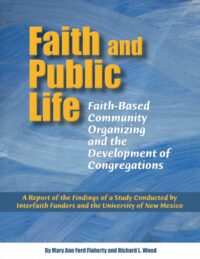By Mary Ann Ford Flaherty and Richard L. Wood
The Congregational Development Research Study (CDRS) examines the impact of faith-based community organizing on organizational development in its primary institutional sponsors—religious congregations. That is, we study whether and how “congregational development” results from the particular form of civic engagement sometimes known as congregation-based, institutional, or broad-based organizing, and termed here “faith-based community organizing.”
Faith-based community organizing (FBCO) represents a widespread movement to advance the interests of low-income and middle-income neighborhoods and communities throughout the United States (and recently in other countries). Most FBCO organizations belong to one of four national or several regional training networks. According to the only national study of the field, FBCO represents the broadest community-based movement for socio-economic justice in the country today. When Interfaith Funders sponsored a series of events in 2000-2001 to disseminate the results of that study, key FBCO funders, sponsors, and participants repeatedly asked what impact this form of civic engagement has had on the diverse faith communities that form its institutional core. At the time, anything other than a purely anecdotal answer to that question was impossible. The CDRS, undertaken by Interfaith Funders and the University of New Mexico with major funding from the Ford Foundation, represents the first national effort to answer it rigorously and systematically.
Click here to download a PDF of the report.
This report was published by Interfaith Funders in 2004. Though the network is no longer in operation, Interfaith Funders transferred several of its reports and articles, including this report, to the USC Center for Religion and Civic Culture to preserve and push forward the insights gained through its work.
